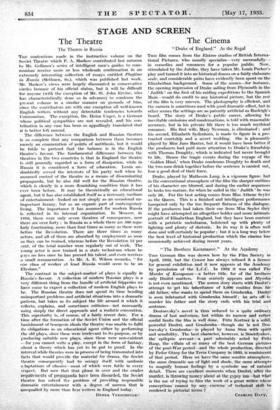"Drake of England." At the Regal Tars film comes from
the .Elstree studios of British Interna- tional Pictures, who usually specialize—very successfully— in comedies and romances for a popular public. Now, stimulated by the Jubilee, they have taken Mr. Louis Parker's play and turned it into an historical drama on a fairly elaborate scale, and considerable pains have evidently been spent on the Elizabethan background. Some of -the scenes—for instance, the opening impression of Drake sailing from Plymouth in the ' Judith' on the-first of his raiding expeditions to the Spanish Main—would do credit to any historical picture, but the _rest of the film is very uneven. The photography is efficient, and the camera is sometimes used with good dramatic effect, but in other scenes the settings are as patently artificial as Burleigh's beard. The story of Drake's public career, allowing for inevitable omissions and condensations, is told with reasonable accuracy, but in his private life there is too much mythical romance. His first wife, Mary Newman, is eliminated ; and his second, Elizabeth Sydenham, is made to figure in a pro- tracted courtship and a secret wedding. . She is pleasantly played by Miss Jane Baxter, but it would have been better if the producers had paid more attention to Drake's friendship with Thomas Doughty, which is indicated but never brought to life. Hence the tragic events during the voyage of the ' Golden Hind,' when Drake condemns Doughty to death and the two men drink together before the sentence is carried out, lose a good deal of their force.
Drake, played by Matheson Lang, is a vigorous figure, but in the conventional atmosphere of the film the sharper outlines of his character are blurred, and during the earlier sequences he looks too mature, for when he sailed in the ' Judith" he was only 26. Far the best acting comes from Miss Athene Seyler as the Queen. This is a finished and intelligent performance hampered only by the too frequent flatness of the dialogue. If the producers had taken their cue from Miss Seyler they might have attempted an altogether bolder and more intimate portrait of Elizabethan England, but they have been content with a patriotic melodrama, bolstered up with plenty of lighting and plenty of rhetoric. In its way it is often well done and will certainly be popular ; but it is a long way below the best level .of historical production which the cinema has occasionally achieved during recent years.
. . .".The Brothers Karamazov." At the Academy , THIS German film was shown here by the Film Society in April, 1932, but the Censor has always refused it a licence for general exhibition and it now appears at the Academy . by permiSsion of the L.C.C. In 1982 it was called The Murder of Karapazov—a better 'title, for of the brothers only Dmitri matters. Ivan scarcely appears and Alyosha is not even mentioned. . The screen Story Starts with Dmitii's attempt to-get his inheritance of 3,000 roubles from his' old father, Who wants to spend them on Grushenka. • Dmitri is soon infatuated with Grushenka himself ; he. sets off, to murder his father and the story ends with his trial and
sentence; - -
Dostoevsky's. novel is thus reduced to a quite ordinary drama of lust and crime, but within its narrow and rather sordid limits the film is well done. Fritz Kortner is a solid, - powerful Dmitri; and Grushenka—though she is not Dos- toevsky's Grushenka—is played by Anna Sten with spirit and sensibility. ,The best character, however, is Smerdyakov, the -epileptic servant—a part - admirably acted by Fritz Rasp, -the villain of so many of the best German pictures of-the post-War period—and the whole production, directed by Fedor Otzep for the Terra Company in.1930, is reminiscent of that period. Here we have the same sombre atmosphere, the same dramatic use of light and shade, 'the same attempts- to magnify human feelings by a symbolic use of natural detail. There are excellent moments when Dmitri, after the murder, is throwing money about at the gypsy inn—but what is the use of trying to -film the work of a great writer whose conceptions. cannot by 'any exercise _ of technical skill be rendered in pictorial terms ?
CHARLES DAVY.










































 Previous page
Previous page